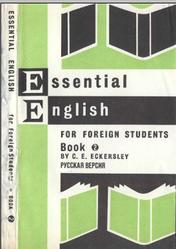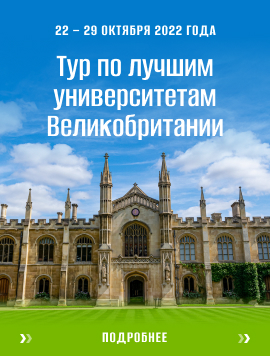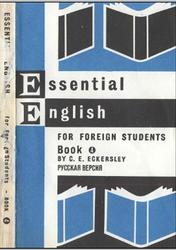What skills do the students get at eckersley school of english
What skills do the students get at eckersley school of english
THE ECKERSLEY SCHOOL OF ENGLISH.
The Eckersley School of English was founded in 1955, and is run personally by John Eckersley and his wife Angela.
The school is situated ‘in the heart of Oxford’, very near to the stores, bookshops, theatres, cinemas, museums and art galleries that are to be found in this historic city. It is also close to many of the ‘colleges’— ancient and modern — that constitute Oxford University.
There are ten Classrooms, a Language Laboratory, a Computer Room, and a Library with a small listening center. When they are not in class, students can relax in the Students’ Room, which has daily newspapers, television, and a drinks vending machine, in the Table Tennis Room or in the patio garden.
There are usually between 60 and 90 students in the School. Most of the students come individually, not in groups, so there are usually students from many different countries.
The courses are designed for adults, not for children. The minimum age for joining the courses is 16 years, but most of the students are aged between 18 and 25, and there are also students in their 30s or 40s. There is no maximum age.
The students are expected to attend classes regularly and to study seriously and to participate actively. The students usually enjoy their studies and the experience of living in Oxford. The lessons are varied, interesting and often amusing. The teachers are well qualified in teaching English as a foreign language and they take great interest in the progress of each student. The number of students in a language class is usually 10—12 (never more than 12). Teachers make use of the Language Laboratory, video recorders and computers, as well as a variety of teaching materials and up-to-date course books.
The School provides a general English Language Course. Students can enroll for a Term or a Summer Vacation Course. The Terms vary in length, but are usually between 8 weeks and 13 weeks. It is also possible to enroll for part of a term only (Short Period).
On the first day all the students do tests in listening, writing and in speaking, and they are then divided into classes according to their level.
There is no obligation to take an examination during your studies at the School. However, many students wish to gain a certificate from an internationally recognized examination organization as a measure of their progress or as a goal for their study.
Every Term and Summer Vacation Course begins with a ‘Getting to Know You’ tea party and ends with a ‘Farewell’ party in the School. Various other social evenings and events, such as video and film evenings, international evenings and parties, are arranged.
There is a full programme for weekend excursions to places of interest, for example: Stratford-upon-Avon, Windsor, London, Bath, Cambridge, Canterbury, Edinburgh and the Isle of Wight.
TASK: Ask 10—12 questions (all types of questions) on the text. Be ready to answer them. (pair work)
HIGHER EDUCATION IN THE USA
I. The American educational system offers about 3,300 higher educational institutions for more than 12 million students. This system comprises different types of institutions: four-year colleges, universities, community/junior colleges, upper-division colleges, technical institutes, and others. Any of these institutions may be public or private, depending on the source of its funding.
Four-year colleges award a bachelor’s degree at the completion of four years of full-time college study. Many four-year colleges also offer graduate study. Four-year colleges may be liberal-arts colleges or specialized colleges.
Liberal arts colleges are undergraduate colleges, sometimes known as colleges of arts and sciences. The study of liberal arts is intended to develop general knowledge and reasoning ability as opposed to specific preparation for a career. Students at colleges of arts and sciences usually study letters/literature, philosophy, history, foreign languages, social sciences and natural sciences. Most liberal arts colleges are privately controlled.
They generally do not offer as many majors in technical and scientific disciplines as comprehensive colleges or universities. One of the best known liberal arts colleges is Dartmouth College.
Specialized colleges concentrate their offerings in one or two specific areas. They include agricultural/technical, art/music, Bible, business, engineering, health sciences, military and teachers’ colleges.
A University generally offers a broad range of both undergraduate and graduate degree programs. Universities are generally larger than other types of institutions. They typically offer more majors and have more research facilities.
Thus, a university is usually a collection of several colleges (liberal arts and specialized colleges) that grant bachelor’s degrees. Besides, every university has one or more graduate schools for those continuing in specialized studies to obtain a master’s or a doctoral degree. The master’s degree requires one or two years of studies beyond the bachelor’s degree. Frequently a thesis is required, or a final oral or written examination.
The doctorate is the highest academic degree. It requires a minimum of two years beyond the master’s degree, success in qualifying examination, proficiency in one or two foreign languages and/or in a research tool (such as statistics) and completion of a doctoral dissertation.
The oldest and the most famous universities in the USA are: Harward, Yale, Princeton, Columbia, Brown, Cornell, University of Pennsylvania, Massachusetts Institute of Technology, University of California, Stanford University (the so-called ‘Ivies’).
Community or junior colleges are two-year colleges that award associate degrees. The majority of them are public and have open admissions policies. 40% of all American students study in junior colleges.
Upper-division colleges offer the last two years of undergraduate study, usually in specialized programs leading to the bachelor’s degree. Students generally transfer to upper-division colleges after completing an associate degree, or after finishing their second year of study at a four-year college.
Technical Institutes award mostly the Associate of Applied Science degree. They provide such courses as: computer-aided drafting, electrical and electronics equipment repair, electronic technology, drafting and design technology, etc.
II. The cost of going to college includes direct educational costs (tuition and fees, books and supplies) and living costs (room and board and other expenses).
Many students receive financial aid to help them get their education: grants, scholarships, jobs and loans. Loans usually have low interest rates and must be repaid, but generally only after the graduation.
III. The academic year usually begins in September and ends in July. Students are classified as freshmen, sophomores, juniors and seniors. A freshman is a first-year student, a sophomore — a second-year student, a junior — a third-year student and a senior is a fourth-year student. Those who study in graduate schools are called graduate students.
During one semester a student studies from 4 to 7 subjects. The first two years of study in most American colleges are devoted to general education. After 2 years of study students select their ‘major’ (the field in which they want their degree), plus a number of ‘electives’.
Typically a student has to earn 30 credits per year (e. g. 1 subject is equal to 5 credits if it meets five times a week) or 120 credits in order to receive a bachelor’s degree at the end of four years of college. Besides, a ‘major’ is taken into consideration (e. g. if a student is majoring in history, he has to earn 50 credits in history subjects to get a Bachelor of Arts).
1. Write out the English equivalents of the following words and word combinations from the text:
Младший колледж, колледж высшей ступени, технический институт, государственный колледж, присуждать степень, степень бакалавра, гуманитарный колледж, специализированный колледж, предмет специализации в колледже, возможности для исследовательской работы, аспирантура, степень магистра, степень доктора, степень младшего специалиста, открытый порядок приема, требования при поступлении, взимать плату за обучение, получать финансовую помощь, специализироваться по предмету, диссертация на степень магистра, докторская диссертация.
2. Make up your own sentences using the words and word combinations above.
NOVEMBER 7, 1636
HARVARD ESTABLISHED
During its early history, the college was closely allied with the Congregational Church (later with the Unitarian), although the state, as founder and patron, long considered it a state institution. Starting with John Harvard, Harvard College was increasingly supported by private contributions.
During the second half of the 19th century especially, Harvard experienced a period of unprecedented development under the presidency of the noted educator Charles W. Eliot. Although the college continued to be the hub of intellectual activity, Harvard became after 1869 a university in the highest sense. Schools that had previously been established — Medicine in 1782, Divinity in 1816, Law in 1817, and Dental Medicine in 1867 — were raised to graduate level, and others were founded: Arts and Sciences in 1872, Business Administration in 1908, Education in 1920, Public Health in 1922, Design in 1936, and Public Administration — now named the John Fitzgerald Kennedy School of Government — in 1937. Radcliffe College, established in 1879 as an institution of higher learning for women, is officially connected with Harvard. It received its present name in 1894, in honor of Ann Radcliffe, who had given Harvard College its first scholarship in 1643.
Harvard University, an enormous educational complex with a huge endowment, has over the years acquired unique prestige and influence. It is the alma mater of notable Americans in politics, law, science, literature, the arts, business and finance, education, and religion. Among its distinguished graduates are John Adams, Franklin D. Roosevelt, John F. Kennedy, Ralph Waldo Emerson, Henry James, and Oliver Wendell Holmes. Its faculty often provides cabinet officers and presidential aides and advisers. Many foreign students, including potential government leaders, are sent to Harvard.
Whereas Harvard College excels as an undergraduate institution, the university is renowned too for its professional schools. It is served by rich art collections, advanced science facilities, and the largest university library in the world, with a collection of over 8 million volumes.
+ VOCABULARY:
1. Julian calendar — юлианский календарь
2. to order the establishment of a college — дать предписание (приказ) об основании колледжа
3. to appropriate — ассигновать
to appropriate sth for: to take money to use for a particular purpose
4. an impressive amount — значительная сумма
5. to scarcely secure the necessities of life — едва обеспечивать себя предметами первой необходимости
6. to be closely allied with — быть тесно связанным с
7. Congregational Church — Конгрегационная церковь
Unitarian Church — Унитарная церковь
8. Unitarian — connected with a Christian group that believes its members should be free to believe what they want
9. patron — покровитель
10. a state institution — государственное учреждение
11. to be supported by private contributions — поддерживаться за счет частных пожертвований
13. under the presidency of the noted educator — под руководством известного педагога
14. the hub of intellectual activity — центр интеллектуальной деятельности
15. an enourmous educational complex with a huge endowment — огромный образовательный комплекс (центр) с внушительным финансированием
16. to acquire prestige and influence — приобретать престиж и влияние
17. a distinguished graduate — выдающийся выпускник
18. to excel as — выдаваться, выделяться
to excel as an undergraduate institution — пользоваться славой известного высшего учебного заведения
19. to be renowned for — славиться чем-либо
to be renowned for professional schools — славиться профессиональными школами
20. to provide cabinet officers and presidential aides — готовить служащих кабинетa министров и помощников президента
I. QUESTIONS ON THE TEXT:
1. When and how was Harvard founded?
2. What was it closely allied with during its early history?
3. What schools are there at Harvard? When were they established?
4. How did Radcliffe College get its name?
5. What is Harvard like nowadays?
6. Who is sent to Harvard?
7. What is the university renowned for?
8. What facilities are there at Harvard?
Поперечные профили набережных и береговой полосы: На городских территориях берегоукрепление проектируют с учетом технических и экономических требований, но особое значение придают эстетическим.
Общие условия выбора системы дренажа: Система дренажа выбирается в зависимости от характера защищаемого.
Essential English for Foreign Students, Book 2, Eckersley C.E.
Essential English for Foreign Students, Book 2, Eckersley C.E.
You have heard (in Book I) about Mr.Priestley and his students. I want, now, to tell you something about his house. He is an old friend of mine, and I went to visit him about a fortnight ago and stayed at his house for the week-end.
He lives in a very nice house. It is called “The Pines” and is about ten miles from London. There is a big garden all round it, and I went in at the garden gate and walked along the path to the front door. There is a smooth lawn in front of the house with beds of roses in it. I knocked at the front door.
Примеры.
Дайте полные ответы.
1. Where is Mr. Priestley’s house and what is it called?
2. What is there in front of the house?
3. What did Mrs. Priestley say about the roses?
4. Where were (a) John, (b) Margaret Priestley?
5. Describe (a) the sitting-room, (b) the dinning-room.
6. What did they have for dinner?
7. Why had Lizzie left the Priestleys?
8. Why does Mr. Priestley think Susan will leave them?
9. What did Mr. Priestley say about his wife’s cakes?
10. What was her reply?
Вставьте соответствующие притяжательные местоимения-существительные:
1. I have a cat; that cat is —.
2. You have a cat; that cat is —.
3. He has a cat; that cat is —.
4. She has a cat; that cat is —.
5. We have a cat; that cat is —.
6. They have a cat; that cat is —.
 СКРЫТА Eckersley School of English
СКРЫТА Eckersley School of English
Eckersley School of English, основанная в 1955 году, считается одним из первых языковых центров Оксфорда. Главной целью педагогов это школы является стремление научить студентов свободно общаться в мультинациональной среде и чувствовать при этом уверенность во всех аспектах владения английским языком. Центр располагается рядом со знаменитым университетом Оксфорда, в самом центре города.
Особенностью школы является обучение в мини-группах, количество учеников в которых не превышает 8 человек во время классных занятий и 12 человек во время семинаров. В школе имеется 10 классных комнат, оборудованных интерактивными досками, современная мультимедийная лингвистическая лаборатория, библиотека, а также беспроводной доступ к сети Интернет на территории всего здания. Для отдыха студентов предусмотрена комната с ТВ и другим аудио и видео оборудованием, настольный теннис, живописный сад на крыше и кухня.
Школа аккредитована Британским Советом и входит в ассоциацию English UK.
Языковые программы для молодежи и взрослых
Полуинтенсивный курс английского языка
Программа предназначена для тех, кто хочет изучать английский язык в утренние часы, а оставшееся время посвящать самостоятельному обучению или знакомству с культурой Великобритании. Все уроки делятся на 3 блока: групповую разговорную практику, работу над проектом и выполнение самостоятельных заданий под руководством преподавателя.
Даты начала занятий: каждый понедельник.
Интенсивный курс английского языка / интенсивный курс + подготовка к IELTS
Программа этого курса предназначена для студентов, которые хотят не просто улучшить свой уровень владения языком, но и ещё более углублённо изучить какие-либо области или пройти подготовку к международным тестам. Занятия английским проходят в утренние часы, а в послеобеденное время студенты посещают свои специализированные занятия. Все уроки делятся на 4 блока: групповую разговорную практику, мастер-классы, работу над проектом в мини-группах и выполнение самостоятельных заданий под руководством преподавателя.
Те студенты, которые в качестве специализированных занятий выберут подготовку к IELTS, будут изучать английский язык более углублённо и попрактикуются в выполнении стандартных заданий с экзамена.
Даты начала занятий: каждый понедельник.
Типовое расписание
| 08:45–09:00 | Обсуждение планов на день |
| 09:00–10:00 | Групповая разговорная практика (до 12 человек) |
| 10:00–10:15 | Перерыв |
| 10:15–11:15 | Грамматика английского языка (до 8 человек) |
| 11:15–11:30 | Перерыв |
| 11:30–12:30 | Развития навыков говорения и восприятия речи на слух (до 8 человек) |
| 12:30–13:00 | Работа над проектом в мини-группе |
| 13:00–14:00 | Обед |
| 14:00–15:00 | Развитие навыков письменной речи и чтения (до 8 человек) |
| 15:00–15:15 | Перерыв |
| 15:15–16:15 | Мастер-класс (до 12 человек) |
| 16:15–16:30 | Подведение итогов дня |
Варианты проживания
Школа предъявляет высокие требования к размещению студентов, поэтому все принимающие семьи и резиденции посещаются представителями школы лично. Благодаря тому, что здание языкового центра расположено в центре города, добраться до него можно прямым маршрутом общественного транспорта от любой резиденции и принимающей семьи. Поездка обычно занимает 20-30 минут.
Семья
Семья предоставляет студенту комфортабельную комнату и двухразовое питание в течение учебной недели. Во время выходных вам будет предложен и завтрак, и обед, и ужин. Обычно ванная комната является общей, но если вам требуется большая приватность, то сотрудники школы подберут варианты размещения с частной душевой.
В окрестностях Оксфорда много семей, которые с радостью принимают иностранных студентов и оказывают им активную поддержку при адаптации к местной жизни. Среди партнёров школы встречаются как семьи с маленькими детьми, так и молодежь.
После того, как вы выберете принимающую семью, сотрудник школы лично съездит к ней, чтобы убедиться, что все условия проживания соответствуют стандартам школы.
Экскурсии и развлечения
Каждый понедельник школьная команда по организации досуга приглашает вновь прибывших студентов на спланированное специально для них мероприятие. Вы сможете встретиться с учениками из других групп, узнать много интересного о школьной жизни и ознакомиться с перечнем ежедневных экскурсий и развлечений.
Типовая развлекательная программа школы включает самые разнообразные развлечения:
Большинство из мероприятий, которые организует школа, являются бесплатными для студентов. Дополнительно могут оплачиваться входные билеты в музеи и экскурсии в другие города Великобритании.
Отзывы
Группа небольшая, но многонациональная: были кореянки, японка, бельгийка, итальянка и тайка. Вне уроков проводила с ними очень много времени, мы сильно сдружили, а еще я повысила свой уровень разговорного английского.
Essential English for Foreign Students, Book 4, Eckersley C.E.
Essential English for Foreign Students, Book 4, Eckersley C.E.
Читатели книг I-III помнят, что уроки группируются вокруг небольшой группы лиц: преподавателя мистера Пристли и его жены, студентов: Лусилл, Фриды, Олафа, Яна, Педро и Хоба. В книге IV завершается рассказ о студентах, и мы увидим, как они прощаются с мистером Пристли, который выпускает их в большой мир. В конце книги III мы узнали о том, что Ян и Фрида полюбили друг друга и, вполне естественно, что в начале книги IV объявляется об их помолвке.
Примеры.
Придумайте предложения со следующими словами из урока 1:
engaged (use also engagement. What is an engagement ring?) Make sentences using engaged to, engaged in, engaged with: congratulations (and the verb congratulate), admit (note two meanings; use also admission), whereas, agreement (What is the opposite?), flat (two meanings), breathe (also breath; note the difference in pronunciation), rent, brick, lettuce (give the names of three other vegetables), suggestion (also suggest), approach, proportion, dig, furniture (mention four different articles of furniture), capital (make three sentences using one of these phrases in each, “a capital letter”, “the capital of England”, “capital in the bank”).
Объясните значение:
1. “Look before you leap.”
2. “Lookers-on see most of the game.”
3. “Don’t look a gift horse in the mouth.”
What skills do students need to succeed?
I recently had the pleasure of speaking at the British Council’s Schools Now! Conference in Abu Dhabi. The conference focused on the challenges that schools face in meeting the expectations of students, parents, examining bodies and employers in the 21 st century.
My talk focused on the skills students need for success in the world of work and life. I explored how, working together with schools, Cambridge International Examinations approaches education and assessment to help students develop these skills.
From a personal perspective, I know how valuable it is to develop a set of skills that you can transfer easily to different situations. I spent a large part of my career in interim management which involved working in over 20 organisations in just 10 years. My skills have moved me across 15 industry sectors including the legal sector, technology, publishing and now education. That’s why I believe it’s so important for students to leave school with skills that help them move easily between jobs and between countries – so they are ready to take up whatever opportunities life offers them.
The challenges
The world is changing technologically and economically at an unprecedented rate. Some of these changes present immense challenges for young people and, in turn, governments, schools and educators.
At Cambridge, the five key challenges that we believe face young people today are:
What are the skills students need to overcome these challenges?
The framework provided by the Assessment and Teaching of 21st Century Skills project at the University of Melbourne, Australia, categorises these skills as:
When students apply for jobs they will need to evidence these different types of skills to be successful. Employers want good communicators, collaborators and problem solvers. I know I do! In the past two years, I’ve been involved in recruiting more than 50 people globally. That’s a lot of CVs! Candidates with a strong skill set always stand out.
How can schools help students develop these skills?
Some schools may choose to offer a curriculum that embeds skills into the curriculum. For example, leadership in sports, groups or drama. Others may decide to have it separate. For example, by offering a Future Leaders Course.
There are advantages and disadvantages to these approaches but I would like to tell you a bit more about the approach we recommend at Cambridge.
Developing these skills with Cambridge
We understand that beyond individual subjects, students need to develop a set of academic skills, life skills and attitudes to be successful.
We support the development of these skills by:
A well designed curriculum should provide an opportunity for students to develop and demonstrate skills such as critical thinking. We have always championed these over the rote learning approach.That’s why we developed our Cambridge Global Perspectives courses. Cambridge Global Perspectives is a cross-curricular, skills-based subjects that encourages students to think critically about a range of global issues from a local, national and global perspective.
Higher-order cognitive skills are important not only for getting into university but for getting on in life. When they start their professional lives, our students will need to be able to adapt and solve problems that transcend academic disciplines. I feel an immense sense of privilege being part of an organisation that plays such an important role in helping young people meet these needs.
Источники информации:
- http://obuchalka.org/2017091696469/essential-english-for-foreign-students-book-2-eckersley-c-e.html
- http://www.globaldialog.ru/countries/great_britain/young_adults/eckersley-school-of-english/
- http://obuchalka.org/2017091696470/essential-english-for-foreign-students-book-4-eckersley-c-e.html
- http://blog.cambridgeinternational.org/what-skills-do-students-need-to-succeed/





 СКРЫТА Eckersley School of English
СКРЫТА Eckersley School of English


